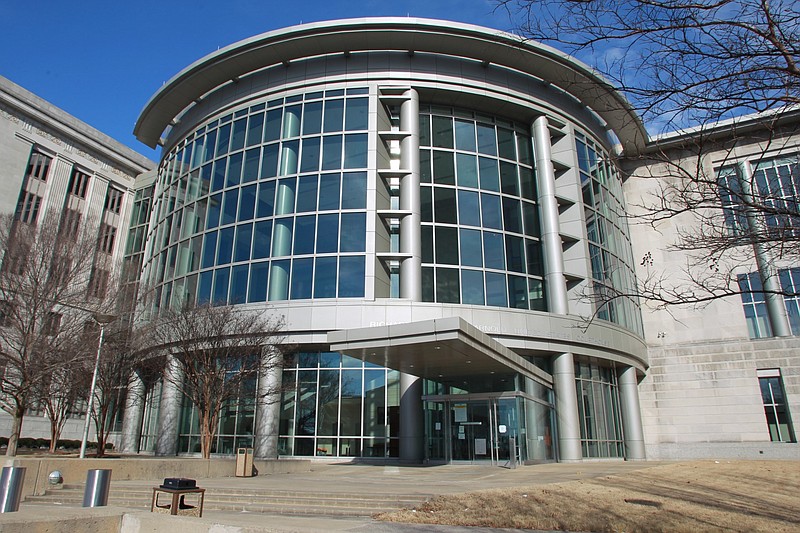A hearing regarding a letter from a concerned juror in the recent conviction of former Little Rock police officer Eddie Scott Seaton on child pornography charges shed little light on the matter despite the public hearing.
According to Chief U.S. District Judge D. Price Marshall Jr. Wednesday, the juror had become concerned about something regarding the jury's deliberations or final verdict that was never disclosed during the hearing but that raised enough concern with Marshall to schedule an on-the-record proceeding with Seaton, his attorney, John Wesley Hall Jr., and Assistant U.S. Attorneys Kristin Bryant and John Ray White to consider the validity of the jury's verdict.
Although the contents of the email were sealed, Marshall did say the juror had expressed concerns over press accounts of the trial he had read after the conclusion of the trial, raising the possibility that the juror might be questioning his or other jurors' decisions.
Seaton, 55, of Cabot, was found guilty May 25 of possession and receipt of child pornography by a jury of nine women and three men who deliberated for about eight hours before agreeing on the two counts following two days of testimony. Immediately after the verdicts were read Marshall ordered Seaton, who had been free on pre-trial release, taken into custody to await sentencing.
The former patrol officer was indicted on the two counts in March 2020, just over two months after investigators raided his Cabot home based on a tip from a North Dakota child sex crimes investigator who on Dec. 11, 2019, downloaded a 9½- minute video containing child pornography over the Bit Torrent network from a computer IP address that was traced to Seaton's home.
The next day, court records said, the investigator downloaded a second video and a JPEG image containing child porn from the same IP address. After determining the computer was located in the Little Rock metro area, Little Rock police were notified. After matching the IP address to Seaton's residence, investigators executed a search warrant at his home.
Over the course of testimony during the trial, jurors heard from the North Dakota investigator as well as the former Little Rock detective he contacted to report the computer activity. They also heard from the state police investigator who interviewed Seaton the day his home was searched, and an FBI computer forensics technician who recovered more than 61,000 deleted images of child porn, adult porn and child erotica from Seaton's home computer.
Seaton -- who took the witness stand in his own defense -- adamantly denied searching for or downloading child pornography
On Wednesday, Seaton was led into the courtroom by a U.S. Marshals escort, shackled and wearing leg irons and black-and-white horizontally striped jail scrubs. Taking his seat next to Hall, Seaton spent the time waiting for the judge talking with Hall and looking over and signing papers.
In considering whether to allow the juror to testify to the inner workings of the jury's deliberations, Marshall said one of three exceptions would have to apply to avoid violating Rule 606(b) of the Federal Rules of Evidence, which states: "During an inquiry into the validity of a verdict or indictment, a juror may not testify about any statement made or incident that occurred during the jury's deliberations; the effect of anything on that juror's or another juror's vote; or any juror's mental processes concerning the verdict or indictment. The court may not receive a juror's affidavit or evidence of a juror's statement on these matters."
The three exceptions say a juror may testify about whether:
(A) extraneous prejudicial information was improperly brought to the jury's attention;
(B) an outside influence was improperly brought to bear on any juror; or
(C) a mistake was made in entering the verdict on the verdict form.
White, who objected to holding the hearing, pointed out that Marshall had polled the jury following the verdict and each juror had affirmed their vote.
Marshall said despite none of the exceptions to Rule 606 being applicable, he still needed to talk with the juror, who had been summoned for the hearing and was waiting outside the courtroom while the attorneys argued.
"It's clear to me from the email that he is concerned about the trial and the verdict and I'm more comfortable doing that on the record with counsel present," Marshall said. "I'll explain to him about the rules of evidence and that it's not proper for us to discuss what happened in the jury room."
"I'm assuming you know I object to this," White said, "right?"
"To my talking to him in general?" Marshall asked.
"To talking to him about this on the record," White said.
Overruling White's objection, Marshall said he had no "intention to go into the particulars," of the email or of the morning's hearing in the matter but said, "he's entitled to know why those are not going to be ventilated, why I'm not going to poll the other jurors and why he's not going to testify."
"The sanctity of the jury's verdict is such and deliberations such that subject to these very limited exceptions," Marshall said, "what happens in the jury room stays in the jury room."

